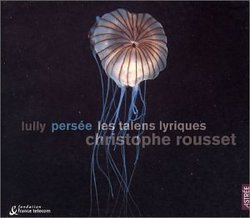Lully's Masterpiece
David Leeson | 06/13/2002
(5 out of 5 stars)
"After three centuries of undeserved obscurity, the lyric tragedies of Jean-Baptiste Lully are finally being rediscovered and revived. Persée (1682) is one of Lully's finest compositions-a true lost masterpiece. Christophe Rousset and his singers and players have done the world a favour by recording this work and making it available to a wide audience.This is not quite the best recording ever of a Lullian opera: in my opinion, Christie's Atys is still the best. However, Rousset's Persée is every bit as good as Herreweghe's Armide, or Minkowski's recent Acis et Galatée. The score is rich and diverse, with less recitative and more choruses and divertissements than usual. The orchestra takes an unusually active part. Quinault's libretto is quite good, and almost worth reading on its own.The performance is top-notch. There are no big names among the soloists-at least, none that I recognize-but they are all excellent. Paul Agnew is appropriately regal, making the most of his surprisingly small role as Perseus. The best parts go to the villains: Salomé Haller and Jéròme Correas are memorable as the wretched Merope and the evil Phineus. The big star here is the choir (Les Chantres de la Chapelle, conducted by Olivier Schneebeli), especially in Act IV, when it moves effortlessly from the despondent "Descondons sous les ondes" to the triumphant "Le monstre est mort, Persée en est vainqueur!" Les Talens Lyriques play very well under the direction of Christophe Rousset.There are only three problems with these discs:First, the English translation of Quinault's lyrics is sometimes poor, and may confuse listeners who do not speak French. For example, in Act IV, Scene 3, Phineus sings: `L'amour meurt dans mon coeur, la rage luy succède.' Roughly, this means: `Love dies in my heart, rage takes its place.' The insert booklet translates these words as `Love has been extinguished in his heart, and anger has taken its place.' This is quite wrong: to who is Phineus referring? A bad translation is better than no translation at all, but the libretto is very important in French Baroque opera, and I wish the producers had taken the time and trouble to produce a better English version of Quinault's poetry.Second, this is a live recording. This is not necessarily a problem: Minkowski's recent live recording of Rameau's Dardanus was studio-quality. However, there is so much dancing in Persée that a `dirty' recording with lots of stage noise was probably unavoidable. (You can even hear the swords clashing during the battle between Perseus and Phineus in Act V). This doesn't bother me-this is still a good recording for a live performance-but it might bother some people.Third, I've heard a better version of Persée. A year before this recording, Persée was revived in Toronto, Canada. These performances were collaborations between Opera Atelier and Tafelmusik, conducted by Herve Niquet. Maybe I'm biased, but I prefer Niquet's version to Rousset's. Niquet's Persée was undoubtedly less authentic than Rousset's, but it was more colourful, energetic, and dramatic. The difference is clearest in Act IV, Scene 7-- the climax of the opera. After Perseus kills the sea monster and rescues Andromeda, the Ethiopians celebrate with the above-mentioned chorus: "The monster is dead, and Perseus is victorious! Perseus is invincible!" In Niquet's version, this was the end of the scene. In Rousset's version, the chorus is followed by a lengthy divertissement, which slows down the story and takes away from the drama. Niquet's version of the chorus was also quicker and livelier than Rousset's.Despite these complaints, I recommend this recording highly. If you're a Lulliste like me, or a fan of French Baroque music in general, then Persée is de rigueur. If you're an opera fan, but don't know much about Lully and the French Baroque, then this is a good place to start. (And if you like this, then you owe it to yourself to purchase Atys, performed by Les Arts Florissants conducted by William Christie)"
My favorite opera recording, ever.
Zaida | Bremerton, WA | 09/15/2008
(5 out of 5 stars)
"I managed to find this some time ago, and immediately purchased it.(It was out of print and unavailable through Amazon by that time) Having heard the operas of Gluck, as well as some other composers, I decided to venture into French Baroque. Since then, I've heard and acquired a number of Lully's operas, as well as a few by the generation of French composers that followed him. However, I believe this one was only surpassed by Rousset's version of 'Roland', and perhaps Niquet's recent one of 'Proserpine'. But unlike a previous reviewer, I would say this is the better rendition of 'Persée', although it lacks the amount of energy that drives Niquet's conducting, or that of the BEMF performances, though the latter are not quite as good as this. But it's simply so divine that I'm not sure it could ever be topped. Stylistically, it is of the second generation of Lully's tragedies, which differ slightly from earlier works such as 'Alceste', an innovation which began with 'Proserpine'. And indeed one commentator on the work said that it was the operas 'Atys' and 'Persée' which were Lully's finest. Get it if you are lucky enough to find it. And if you can't, go for 'Proserpine', 'Atys', or 'Roland' if you aren't familiar with Lully."
One of Best Lully recording
J.I. | Tokyo, Japan | 10/21/2002
(5 out of 5 stars)
"If you love Lully or his "Atys", you will be love this exciting rcording.
Christophe Rousset and his Les talens lyriqus' one of finest recording!
Singers are Paul Agnew, Anna Maria Panzarella, Salomé Haller, Jérôme Correas, Vincent Billier, Monique Simon, Robert Getchell, Béatrice Mayo Feli, Laurent Slaars, Cyrisl Auvity, Bruno Rostand.
If you like French baroque opera, some of them are familier... Angew and Panzarella are so sweet.... Haller will be future baroque star (she will sing Handel's Agrippina in 2003)..."

